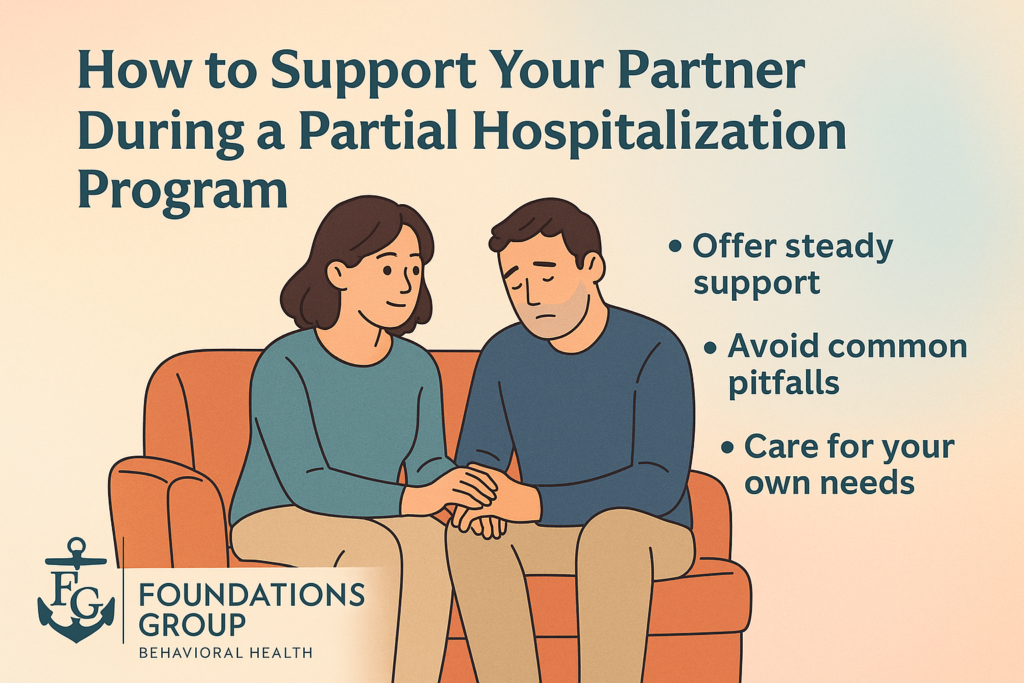When your partner enters a Partial Hospitalization Program, you probably feel two things at once: hope and fear. Hope that they’re finally getting the help they need. Fear that you don’t know how to help… or if you’ll get it wrong. This isn’t easy—your feelings are valid. But you can support them without sacrificing yourself.
This guide breaks down what works, what doesn’t, and how to stay grounded when your world feels flipped upside down.
What Is a Partial Hospitalization Program (PHP)?
A Partial Hospitalization Program (PHP) is one of the highest levels of outpatient care for mental health. It provides intensive therapy during the day—usually 5 to 6 hours, 5 days a week—while allowing participants to return home each evening.
What makes PHP different?
- Structured treatment with therapy, group sessions, and psychiatric care
- Home life continuity, letting people stay connected to loved ones
- A step-down option for those leaving inpatient care, or a step-up from weekly therapy
If your partner is in a Partial Hospitalization Program in Cape Cod, MA, it’s a sign they’re taking their mental health seriously—without disappearing from your daily life.
The Emotional Reality of Loving Someone in PHP
Let’s be honest: it’s not just about their healing. You’re dealing with your own emotional rollercoaster. Some common feelings that partners experience:
- Relief they’re finally getting help
- Fear of the unknown (“What happens after this?”)
- Guilt for feeling frustrated or tired
- Anxiety about saying or doing the wrong thing
- Hope for rebuilding the relationship
It’s okay to have all these feelings at once. You’re not a bad partner—you’re human.
What Support Really Looks Like During PHP
Your partner doesn’t need you to be perfect. They need you to be steady. Here’s what real support can look like:
- Listening without fixing. Sometimes, the best thing you can say is, “That sounds really hard. I’m proud of you for sticking with this.”
- Respecting their recovery process. That might mean honoring quiet time after sessions or adjusting routines temporarily.
- Celebrating small wins. “You made it to every session this week—I see how hard you’re working.”
- Being patient with emotional ups and downs. Healing isn’t linear. Bad days don’t mean failure.
One partner described it like this:
“I used to think I had to ‘manage’ their recovery. PHP taught me to be their teammate, not their project manager.”
What to Avoid: Common Pitfalls That Burn People Out
Even with the best intentions, it’s easy to fall into unhealthy patterns. Watch out for these common traps:
- Trying to be their therapist. You’re their partner, not their clinician.
- Monitoring their progress too closely. Constant check-ins can feel like pressure.
- Neglecting your own needs. You can’t pour from an empty cup.
- Letting resentment fester. Suppressed frustration can explode later—address it early and kindly.
Remember: you are allowed to have boundaries and be supportive at the same time.

Why Your Own Support System Is Non-Negotiable
Caring for someone in treatment can be emotionally exhausting. The strongest thing you can do is make sure you have your own outlets:
- A therapist of your own
- Support groups like NAMI Family Support or Al-Anon (yes, even for mental health—it’s about coping skills, not just addiction)
- Friends who let you vent without judgment
- Hobbies or activities that are just yours
Think of it like this: they’re in treatment full-time. You need your own version of support to stay afloat, too.
What Progress Really Looks Like in PHP
It’s natural to look for obvious signs of success—big attitude changes, better communication, or more emotional connection. But here’s the truth: progress often shows up quietly:
- Attending all their sessions even when they don’t feel like it
- Talking about their feelings, even clumsily
- Recognizing unhealthy patterns they hadn’t seen before
- Having more emotional awareness, even if it means more crying or frustration early on
Think of PHP like emotional physical therapy—there’s soreness before strength returns.
What Happens After PHP? Preparing for the Next Chapter
Many people transition from PHP to an Intensive Outpatient Program (IOP) or weekly therapy. It’s common to fear the “what’s next” phase.
Talk openly about aftercare plans:
- Will they step down to IOP?
- Do they have a therapist lined up?
- What boundaries or routines can you both agree on post-treatment?
You don’t have to know all the answers, but starting these conversations early can ease post-treatment anxiety.
Frequently Asked Questions (FAQ)
How long does a Partial Hospitalization Program last?
Most PHPs run for 2 to 6 weeks, depending on individual progress and needs. Some people may stay longer if clinically recommended.
Should I attend sessions with my partner?
Some programs offer family therapy or education sessions. If invited, these can be incredibly helpful. But day-to-day therapy is usually private, allowing your partner to focus on personal growth.
What should I say (or not say) after their sessions?
Keep it simple:
“Do you want to talk about it or unwind?”
Avoid pressing for details—respect their process, but let them know you’re there.
Is it normal to feel resentful or tired?
Absolutely. You’re adjusting too. Talk to your own support system about it—it’s healthy to process your feelings separately from your partner.
What if my partner starts skipping sessions?
Skipping sessions can be a red flag. Gently express your concern without scolding. If it continues, reach out to their treatment team (with their permission) or encourage them to reconnect with support.
Can we still have fun while they’re in PHP?
Yes! Joy and connection are part of healing. Respect their energy levels, but plan small enjoyable things—movies, walks, shared meals—that remind you both of the good in your relationship.
You’re Allowed to Love Them and Take Care of Yourself
Loving someone in a Partial Hospitalization Program means holding space for both their healing and your own wellbeing. You’re not responsible for their progress, but you can be a meaningful part of their journey.
Ready to Support—Without Losing Yourself?
You don’t have to figure this out alone. Call 888-685-9730 or visit Foundations Group Behavioral Health Partial Hospitalization Program in Cape Cod MA to get the right resources, guidance, and compassionate support for both you and your partner.








